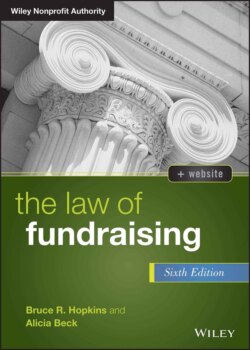Читать книгу The Law of Fundraising - Bruce R. Hopkins - Страница 29
(a) Types of Professional Fundraisers
ОглавлениеThree types of professional fundraising executives work for and with charitable organizations to direct and manage fundraising programs. Legislation and regulation provide guidelines for the relationship between organizations and those who perform fundraising on their behalf, and distinguish among the three types.
1 Fund Development Officer. A fund development officer is a full-time salaried employee of the organization and receives the same standard employment benefits of all other employees. Most regulations are silent about employees who perform fundraising, choosing rather to regulate the organization itself. The fund development officer designs the fundraising program in keeping with the organization's priority needs, selects the fundraising methods required to produce the income needed, and supervises operations on a daily basis. To make the development process work, the development officer must also set and meet goals and objectives; identify committees; assign functions and manage them successfully; recruit and train leaders and volunteers; hire and train staff; write policies and procedures, have them approved, and see that they are followed; prepare budgets and supervise expenses; perform and report results and analyses; keep confidential records accurately and discreetly; design and implement a donor recognition system; and more.
2 Fundraising Consultant. A fundraising consultant is an individual or firm hired for a fee to provide services of advice and counsel to charitable organizations on the design, conduct, and evaluation of their fundraising enterprises. Most regulations require consultants to register with state authorities, file a copy of contracts for service, and be bonded when the handling of gift dollars will occur. Consultants are available to guide staff and volunteers on specific fundraising methods (direct mail, telephone, planned giving, capital campaigns, and the like), to perform objective studies and analysis of the design and conduct of comprehensive fundraising programs, and to provide executive search, marketing, public relations, and other services. Consultants do not usually conduct solicitations directly, nor do they handle gift money, but they can and do assist these efforts. Consulting staff can be retained to perform all of the duties of the fund development officer, usually for a specified period until full-time employees can be hired and trained.
3 Professional Solicitor. A professional solicitor is an individual (or firm) who is hired, for a fee or on a commission or percentage basis, to perform a fundraising program or special event directly in the name of the organization, to solicit and receive all gifts, to deposit funds and pay expenses, and to deliver net proceeds to the charity. Legislation and regulation of professional solicitors are the most intense because of past conduct by those whose fees and expenses have been high and who have delivered net proceeds in the area of only 20 percent or less of gross revenues. Solicitor firms are more likely to attract smaller and newer organizations (or “noncharities” for whom the gift deduction is no longer allowed) who believe they lack the ability to mount their own fundraising programs and thus are easy prey to the sales pitch that promises gift revenue with no effort on the organization's part.
In making a choice among fundraising professionals, charitable organizations should compare their cost-effectiveness. Fund development officers and professional consultants perform similarly and produce net returns of from 75 to 80 percent of net income. Professional solicitors return 20 percent or less of net income.
Several other features that relate to the separate role of fundraising professionals are discussed as follows.
